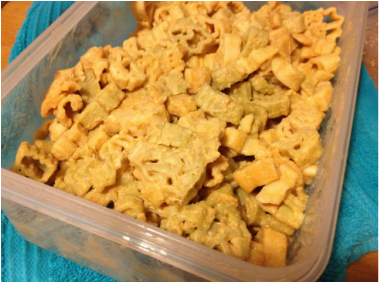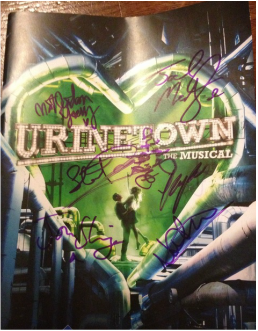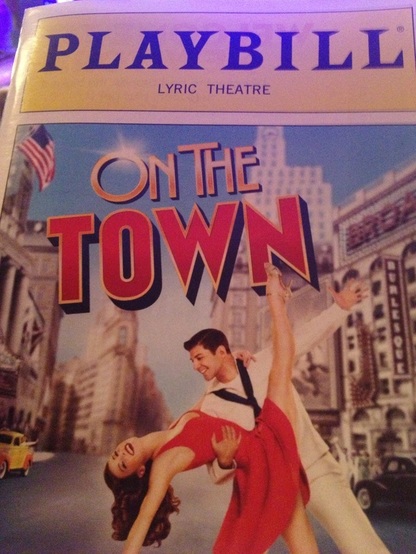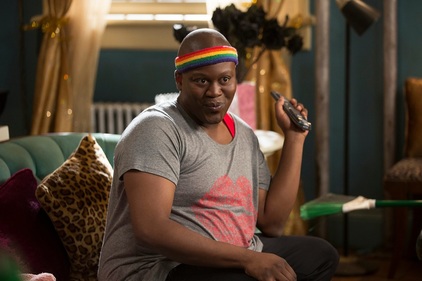 It's Still Chanukah! Fried Maccabees/Mac & Cheeseby Randi / December 19, 2014
It's Still Chanukah! Fried Maccabees/Mac & Cheeseby Randi / December 19, 2014 This is my nightmare, honestly. No exaggeration, do you know how much I pee? In the dystopian society of “Urinetown”, it is indeed ‘a privilege to pee’: You have to pay at a public utility each and every time you have to use the bathroom. Because of a 20-year drought, there are no more private bathrooms, and because it’s a dystopia, if you pee in the woods or in a bush or relieve yourself in any way (even accidents) without paying your fee, you get “sent to Urinetown”. It’s in quotes because it is indeed a euphemism for something horrible.
Who does all of that money go to? Why, obviously a private corporation! “Urinetown” was written by Mark Hollman and Greg Kotis before its first production in 2001, so these guys were Nostradamus levels of prescient. Okay maybe not Nostradamus because corporate takeover was happening then too but now it’s like crazy so this show seems even more appropriate and smart than it did back then. The superbly named Urine Good Company, run by evil mastermind Caldwell B. Cladwell (played wonderfully by British comedian Phill Jupitus), implements utility price hikes at its will, pays off all the weasely politicians to push terrible legislation through, and sends poor people who can’t pay for their morning pee off to Urinetown. He bad.
Or is he? One of the most interesting aspects of this show is how they blur all the lines distinguishing between the good guys and the bad guys. Cladwell may be a mean man responsible for lots of deaths, but his public bathroom system exists for a reason: There is extremely little water in the ground, and it has to be regulated. If toilet usage went up too much, the fragile water supply would be destroyed, hence his price hikes and strict rules for using the utilities. Now sure, people should still be able to pee in bushes without causing serious damage, but I didn’t see any shrubbery. Also, it would smell. Cladwell prides himself on keeping water in the ground and pee off the street.
Adding to the horror of this society is that no one actually knows what Urinetown is, except for apparently two policemen, who take victims there, and Cladwell, who invented it. The public assumes it’s a terrible sort of exile, a place even worse than the town we see, but it’s more than that. I feel I shouldn’t say.
One of the cops is also the narrator. He’s pretty funny and scary at the same time, but I got distracted by how strangely he pronounced some words in his attempt to turn his British accent into an American accent and then into a New York accent. People, there is no reason for this show to be American. The whole world is suffering and drying up in this show, so if they wanted it to be British they could have and then I wouldn’t have been distracted by accent issues. Of course, then it wouldn’t make sense when Cladwell talks about how much money he spent on his daughter’s college education; that’s an American thing.
His daughter is Hope Cladwell, a bright-eyed and bushy-tailed young girl who wants everyone to be happy!!! and who expects to take over her father’s company before her eyes are opened to the world of poverty and anguish that he is extorting. She falls in love with a young man, Bobby Strong, who works in one of the poorest public utilities, and Bobby shows her the real world and how awful it is. Together, along with a rag tag group of povers who look like zombies, they resolve to bring down Urine Good Company and let everybody pee for free! Yay! Peeing for free is the dream. I guess that’s another reason they didn’t set it in Britain – there are so many ‘public’ bathrooms that you actually have to pay for here*. Already. It’s starting.
*In fact, Greg Kotis got the idea for “Urinetown” when he was traveling through Europe and encountered all the pay toilets. How scary is that! It really is real.
Bobby is played by Matthew Seadon-Young, and he’s fantastic. He looks kind of like Superman but wearing his Clark Kent glasses. He sings really well and dances so furiously that an extended applause break was pretty much just to let him catch his breath. That extended applause came during the best number, “Run Freedom Run”, which kind of sounds like peeing yourself. It’s the most fun song in the show, done in a spiritual fashion, when the whole chorus gets to shine.
All the songs in this score, which won a Tony, have a clear purpose. I don’t remember thinking ‘they should have cut this’ at any point, meaning I wasn’t bored. The score is fun because all the songs are so different. You have the aforementioned high-pace spiritual. You have the lovely love song ‘Follow Your Heart’, with Bobby and Hope (a clear-voiced Rosanna Hyland) professing their love for each other, which made me think of the Love Theme from “The Hurt Locker: The Musical” (look it up). You have the dark and scary poor-chorus numbers ‘It’s a Privilege to Pee’ and ‘What is Urinetown’, the comic and ridiculous ‘Don’t be the Bunny’ by Cladwell, and more. None sounds like the other, or like anything else, and that is huge. The songs are much simpler than Sondheim, but it reminded me of his style because you don’t leave humming any easy melodies. There are no easy melodies here.
The book is structured as a look back on these sad times, with Officer Lockstock (not to be confused by his partner in fighting crime and committing crimes, Officer Barrel — GET IT?!) also acting as the narrator of this sad story. Little Sally, the most likable character in the show, is a poor spunky Annie-type girl who keeps asking Officer Lockstock why everything is so depressing and sad when this is a musical! And he responds that it’s not a happy musical. And Little Sally will say “But it’s still a musical!!” Karis Jack is fantastic here, in her West End debut. Lockstock is pretty good too but needs to work on the accent.
Obviously you root for the poor ‘good’ people against the evil corporation, and you are glad when the fighting is over and they come out on top. (Except for some of our main characters, who shockingly get sent to Urinetown. Not expected!) But more of this show’s twisted brilliance comes through in the epilogue. You had to pay for a reason, remember? There’s barely any water left. And without regulation, Hope’s new system of do what makes you happy!!! dries up everything pretty fast, resulting in a world that is, if possible, worse than what it was under corporate control. At least there was control there. That’s when they all realize that Urinetown, the horrible tortuous place they thought criminals (unpaying pee-ers) were exiled to, was actually where they lived now. They brought it upon themselves. (Also, Urinetown wasn’t that kind of exile, you learn in Act II. The truth is pretty grim.) It’s pretty freaking dark, right! Yet it’s so funny and enjoyable. This show is like a comedic “Sweeney Todd”. So much death, so much tragedy, and you laugh way too much. Definitely a must-see before it prematurely closes in a month. Anyway I have to go pee now. FOR FREE.
Adding to the horror of this society is that no one actually knows what Urinetown is, except for apparently two policemen, who take victims there, and Cladwell, who invented it. The public assumes it’s a terrible sort of exile, a place even worse than the town we see, but it’s more than that. I feel I shouldn’t say.
One of the cops is also the narrator. He’s pretty funny and scary at the same time, but I got distracted by how strangely he pronounced some words in his attempt to turn his British accent into an American accent and then into a New York accent. People, there is no reason for this show to be American. The whole world is suffering and drying up in this show, so if they wanted it to be British they could have and then I wouldn’t have been distracted by accent issues. Of course, then it wouldn’t make sense when Cladwell talks about how much money he spent on his daughter’s college education; that’s an American thing.
His daughter is Hope Cladwell, a bright-eyed and bushy-tailed young girl who wants everyone to be happy!!! and who expects to take over her father’s company before her eyes are opened to the world of poverty and anguish that he is extorting. She falls in love with a young man, Bobby Strong, who works in one of the poorest public utilities, and Bobby shows her the real world and how awful it is. Together, along with a rag tag group of povers who look like zombies, they resolve to bring down Urine Good Company and let everybody pee for free! Yay! Peeing for free is the dream. I guess that’s another reason they didn’t set it in Britain – there are so many ‘public’ bathrooms that you actually have to pay for here*. Already. It’s starting.
*In fact, Greg Kotis got the idea for “Urinetown” when he was traveling through Europe and encountered all the pay toilets. How scary is that! It really is real.
Bobby is played by Matthew Seadon-Young, and he’s fantastic. He looks kind of like Superman but wearing his Clark Kent glasses. He sings really well and dances so furiously that an extended applause break was pretty much just to let him catch his breath. That extended applause came during the best number, “Run Freedom Run”, which kind of sounds like peeing yourself. It’s the most fun song in the show, done in a spiritual fashion, when the whole chorus gets to shine.
All the songs in this score, which won a Tony, have a clear purpose. I don’t remember thinking ‘they should have cut this’ at any point, meaning I wasn’t bored. The score is fun because all the songs are so different. You have the aforementioned high-pace spiritual. You have the lovely love song ‘Follow Your Heart’, with Bobby and Hope (a clear-voiced Rosanna Hyland) professing their love for each other, which made me think of the Love Theme from “The Hurt Locker: The Musical” (look it up). You have the dark and scary poor-chorus numbers ‘It’s a Privilege to Pee’ and ‘What is Urinetown’, the comic and ridiculous ‘Don’t be the Bunny’ by Cladwell, and more. None sounds like the other, or like anything else, and that is huge. The songs are much simpler than Sondheim, but it reminded me of his style because you don’t leave humming any easy melodies. There are no easy melodies here.
The book is structured as a look back on these sad times, with Officer Lockstock (not to be confused by his partner in fighting crime and committing crimes, Officer Barrel — GET IT?!) also acting as the narrator of this sad story. Little Sally, the most likable character in the show, is a poor spunky Annie-type girl who keeps asking Officer Lockstock why everything is so depressing and sad when this is a musical! And he responds that it’s not a happy musical. And Little Sally will say “But it’s still a musical!!” Karis Jack is fantastic here, in her West End debut. Lockstock is pretty good too but needs to work on the accent.
Obviously you root for the poor ‘good’ people against the evil corporation, and you are glad when the fighting is over and they come out on top. (Except for some of our main characters, who shockingly get sent to Urinetown. Not expected!) But more of this show’s twisted brilliance comes through in the epilogue. You had to pay for a reason, remember? There’s barely any water left. And without regulation, Hope’s new system of do what makes you happy!!! dries up everything pretty fast, resulting in a world that is, if possible, worse than what it was under corporate control. At least there was control there. That’s when they all realize that Urinetown, the horrible tortuous place they thought criminals (unpaying pee-ers) were exiled to, was actually where they lived now. They brought it upon themselves. (Also, Urinetown wasn’t that kind of exile, you learn in Act II. The truth is pretty grim.) It’s pretty freaking dark, right! Yet it’s so funny and enjoyable. This show is like a comedic “Sweeney Todd”. So much death, so much tragedy, and you laugh way too much. Definitely a must-see before it prematurely closes in a month. Anyway I have to go pee now. FOR FREE.







